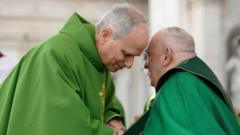In a swift conclave decision, Cardinal Robert Prevost was elected as the new pope, indicating a collective consensus among the voting cardinals regarding his capabilities to navigate the challenges confronting the Catholic Church. The discussions leading up to the conclave were underscored by a recurring emphasis on "continuity" and "unity," reflecting the cardinals' desire for a leader who could build on Pope Francis's transformative outreach efforts. His predecessors’ focus on marginal communities and voicing concerns for the underprivileged has set a foundation for Prevost's papacy.
Prevost, appreciated for his behind-the-scenes support for Pope Francis, was deemed acceptable across diverse factions within the Church, often divided between traditionalist and progressive perspectives. In the context of current global strife and discord, the cardinals recognized a need for leadership that resonates with both the Church and humanity at large.
Taking into account Pope Francis's sometimes tenuous rapport with U.S. allies on critical issues such as migration, climate change, and social inequality, Prevost's background as a dual national—both Peruvian and American—positions him as a potential mediator across cultural divides. His inaugural address on St. Peter's balcony echoed themes of "building bridges" and the notion of global unity, reminiscent of Pope Francis’s ethos.
As his papacy commences, Prevost will be under scrutiny regarding his previous political stances, experience with institutional challenges, and approach to sensitive social issues. The initial confidence shown by the cardinal electors suggests a belief in his ability to guide the Church as a moral compass, even amidst looming global issues. With just four ballots required for his election, Prevost holds a solid mandate, setting the stage for a promising new chapter for the Catholic Church.


















